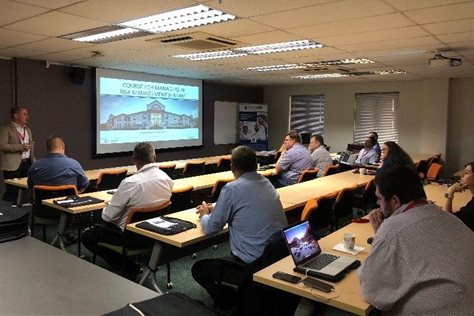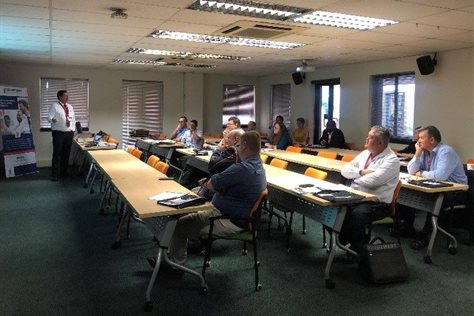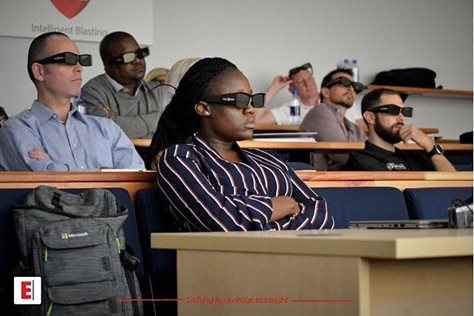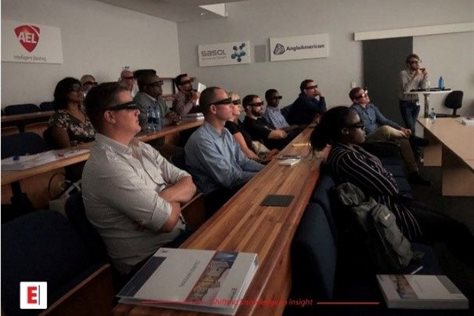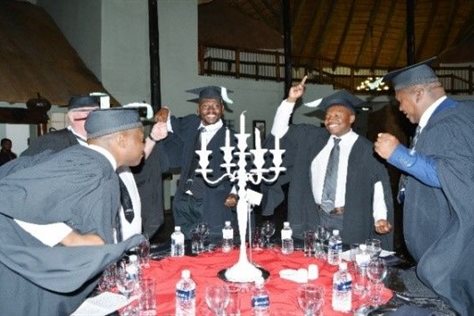While mining has traditionally been a key driver of the South African economy, and despite the growth of other industries, mining continues to contribute considerably to economic productivity and the country's gross domestic product (GDP). Notwithstanding South Africa's immense natural resources, the country's continued expansion is hampered by a number of challenges in the mining industry, mostly that of a lack of skills.
In this regard, Prof Ronny Webber-Youngman, Head of the Department of Mining Engineering at the University of Pretoria, says that a new approach to leadership is required. While machines will undertake the linear labour in the Fourth Industrial Revolution (4IR), the function of people on a mine will never be obsolete; instead, their responsibilities will evolve, necessitating the acquisition of new skills.
"Most organisations are a bit late in updating technology, and some do not have the vision to realise that technology is really not going to take away jobs, but it is going to optimise and enhance productivity, safety and health," Prof Webber-Youngman said.
To that end, the Department collaborated with Enterprises University of Pretoria (Enterprises UP) to develop a series of programmes and short courses, such as the Leadership Development Programme, and the short courses in Blasting Engineering, Risk Management, and Technical and Operational Surface Mining. These will ensure that mining professionals are prepared for the future of work, and are able to adapt and consistently gain new skills.
"We identified the need to develop technical and soft skills, and in that context, qualities such as leadership are necessary to be more employable," Prof Webber-Youngman noted.
4.0DTM leadership development
Over the last three years, almost 700 delegates have attended the two-day 4.0DTM Leadership Development short course, which explores leadership traits using a four-dimensional prism model. Its goal is to prepare leaders for the challenges that will be brought about by the 4IR, also known as Industry 4.0. In a volatile, confusing and ambiguous world of cyber- and nanotechnology, leaders' capacity to make difficult decisions, exercise emotional intelligence, have an effect, inspire, motivate and cope with complexity is emphasised.
"We developed the 4.0DTM Leadership Development Model for the 4IR," said Dr Johan Uys, lecturer and course leader in the Department of Mining Engineering.
"Technology does not drive leadership; rather, leaders lead technology," Dr Uys continues. One of the primary things we investigated was people's acceptance of technology, as there is a fear that technology would render humans obsolete and take over the world. We also researched the leadership skills required for the 4IR, and it appears that the model correlates incredibly well with the identified skills. These skills include emotional intelligence (EQ), complex problem solving, negotiations, complexity and inductive reasoning; skills that will lead to the development of technology."
Alumni learning experience
“We worked very hard during the programme and we learnt a lot. We learnt about management, about people and about ourselves as well. I am sure it has helped me to be a better supervisor and manager for my team.” |
Programme in blasting engineering
During the past nine years, the Blasting Engineering Programme was delivered to over 600 participants. This brief course covers the fundamentals of all surface and underground mine drilling and blasting operations. Real-world circumstances are used to improve the application of drill and blast design and execution in the mining sector. Throughout the course, case studies are discussed, and the downstream implications and processes of blasting outcomes are evaluated to ensure that the drilling and blasting cycle is continuously improved.
"The industry’s response has been really positive; the programme is very well received in the market. The delegates we train are much more confident after participating in this programme. They can engage with their clients about drilling and blasting challenges," said Mr Wolter de Graaf, course leader.
"We have discovered that when technology advances, we must train our employees to adapt." We make extensive use of virtual reality and interaction throughout the course/programme. The high-quality, realistic visuals create an engaging user experience for a wide range of real-world applications. The hardware of the blasting equipment is used in live sessions to demonstrate how to programme."
Alumni learning experience
“This programme was really interesting and I am very pleased with the outcome of the course. My highlight was when we did the practical training, especially the VR training that was mind blowing. To this, I would like to implement VR training because I provide a lot of training to employees where I work. I am going to take the knowledge I gained from here and share it with my fellow colleagues.” |
Programme in technical and operational surface mining excellence
"We recognised a need in the market for technical surface mining training because no other courses teach new mining graduates and professionals about the technical aspects of surface mining." The Programme for Technical and Operational Surface Mining Excellence was developed in 2018 and launched in 2019. Henk Fourie, course leader for the programme, explained, "For the last four years, there has been a phenomenal increase in attendance."
This programme is meant to provide delegates with the technical skills they need to become successful and value driven. All aspects of mineral resource management are addressed, as well as the selection, productivity and maintenance of heavy mining equipment. Support services, mine rehabilitation and closure, and legislative requirements are all covered in the programme, as well as performance management, operational control, and efficiency improvements. "The programme's primary goal remains to provide delegates with technical knowledge that will enable them to be effective and successful managers at all levels of a surface mine," Fourie said.
"People from many walks of life have learnt more about surface mines as a result of this programme. At first, we had graduates and individuals with mining engineering knowledge, but over the last three years, we have received geologists, metallurgists, people who do mining simulation, analysts from financing companies, accountants and individuals from the logistics industry, primarily because it is the only programme of its kind in South Africa that uses technical knowledge for surface mines on a relatively senior level," said Johan Hager, course leader.
Alumni learning experience
“The programmme was very informative. I learnt a lot and would recommend it to anyone. I thoroughly enjoyed the course. It was very informative and useful for what I do. I enjoyed the course presenters. They were very friendly and easy to approach.” |
Course for managers in risk management
The short courses that make up the Course for Managers in Risk Management (c-MiRM) are designed to provide a systematic approach to establishing and maintaining a multi-dimensional risk management framework with well-defined principles and methods. The courses synchronise risk management procedures in present and future implementations of International Standards such as ISO 31010:2019 (Risk Management Techniques) and ISO 45001:2018 using the concepts and framework of ISO 31000:2018. (Occupational Health and Safety Management Systems).
There are three levels to the course:
- Course for Managers in Risk Management Fundamentals (c-MiRM-F)
- Course for Managers in Risk Management (c-MiRM)
- Course for Managers in Risk Management Advanced (c-MiRM-A)
According to Albert van der Vyver, course leader, the Department of Mining Engineering has been providing a risk management curriculum to the industry for about ten years in collaboration with Enterprises UP. It was taken to the next level when Enterprises UP was tasked with assisting with the development of a formal risk management system in Turkey in the aftermath of a massive subterranean explosion that killed 310 people.
"It was time to put practical ideas into action, and the c-MiRM model was developed spontaneously. It worked successfully, implying that the course might offer a solid platform for long-term mortality reduction in the mining sector."
Alumni learning experience
“I had a great time attending this course; it was well structured, and the facilitator was well equipped and able to link it to our daily activities, as well as the organisation as a whole. He was able to take us through all relevant areas and tried by all means to make us understand the whole concept of risk management. I am going to take the knowledge I gained from here and share it with my fellow colleagues.” |
These programmes make the Department's expertise available to members of industry for the purpose of skills development and capacity building. They also enable professionals in the mining industry to be more successful in developing practical, long-term solutions for society.
Enterprises UP has also developed comparable courses to upskill professionals across all aspects of business, and continues in its efforts to shift knowledge to insight.
If you are interested in registering, enquiring or requesting quotations for individual or corporate training options of courses, kindly contact our Client Information Centre:
Tel: +27 (0)12 434 2500
Email: az.ca.pu.sesirpretne@ofni
Quotations: az.ca.pu.sesirpretne@etouq















































